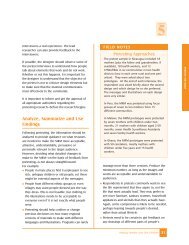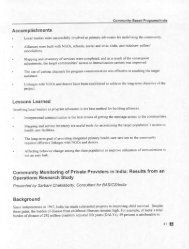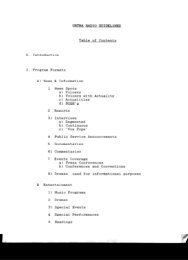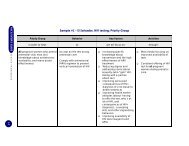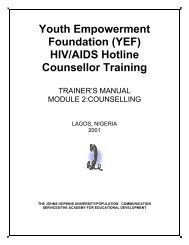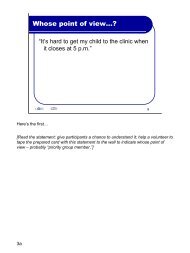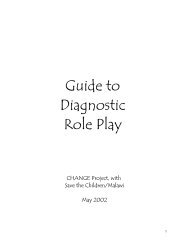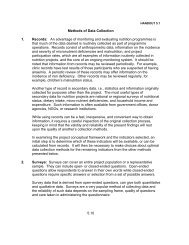MODULE TWO: COUNSELLING - FHI 360 Center for Global Health ...
MODULE TWO: COUNSELLING - FHI 360 Center for Global Health ...
MODULE TWO: COUNSELLING - FHI 360 Center for Global Health ...
You also want an ePaper? Increase the reach of your titles
YUMPU automatically turns print PDFs into web optimized ePapers that Google loves.
would be available (in<strong>for</strong>mation about the other counsellor’s schedules should be<br />
readily available).<br />
♦PROBLEM: A counsellor is not able to establish rapport with the<br />
caller, and it is unclear why. Like the situation above, the counsellor should<br />
acknowledge the caller’s discom<strong>for</strong>t and try to discover the reason behind it.<br />
(Ex: “It appears that you are not com<strong>for</strong>table speaking with me. What can I do<br />
to make this more com<strong>for</strong>table <strong>for</strong> you?”). If possible, the counsellor should<br />
then use the caller’s response to improve the rapport. If this is not possible, the<br />
counsellor should offer to transfer the caller to someone else or invite the caller<br />
to call back at another time.<br />
♦PROBLEM: A counsellor and caller know each other. In general, it is<br />
not appropriate <strong>for</strong> a counsellor to counsel someone that s/he knows. It can be<br />
difficult to know <strong>for</strong> certain over the phone whether or not a counsellor and a<br />
client know each other, however. Sometimes a counsellor may recognise a caller<br />
but the caller may not recognise the counsellor. Sometimes a caller may<br />
recognise the counsellor, and ask <strong>for</strong> his/her full name in order to verify this fact.<br />
In either case, the counsellor should not reveal his/her full name. S/he should<br />
explain to the caller that it would be best <strong>for</strong> him/her to speak with another<br />
counsellor who would be better equipped to handle his/her situation and proceed<br />
to transfer the call. If no other counsellor is available, the counsellor can take the<br />
call, but s/he should be sure to respect the caller’s confidentiality (as is the case<br />
with all calls).<br />
♦PROBLEM: A caller asks <strong>for</strong> in<strong>for</strong>mation that the counsellor does not<br />
know. It is perfectly okay <strong>for</strong> a counsellor to say, “I don’t know” if s/he does<br />
not know the answer to a question. Counsellors are not expected to know<br />
everything, and they should in<strong>for</strong>m the callers that they might not have all of the<br />
in<strong>for</strong>mation that they are seeking, but that they will try to find it. If the<br />
in<strong>for</strong>mation can be obtained quickly from the YEF HIV/AIDS Hotline staff, then<br />
the counsellor can put the caller on hold. If it will take more time to find the<br />
in<strong>for</strong>mation, however, then the counsellor can ask the client to call back later.<br />
♦PROBLEM: A caller talks continuously or inappropriately. If the caller<br />
talks non-stop without giving the counsellor a chance to speak, or the caller does<br />
not seem to be making sense, the counsellor should try to redirect the<br />
conversation. This can be done through interrupting the caller in a polite way,<br />
such as stopping him/her to summarise what s/he said and make sure that it has<br />
been understood. (Ex: “Let me just stop you <strong>for</strong> a minute to make sure that I<br />
have understood what you have told me….).<br />
♦PROBLEM: A caller becomes offensive or aggressive. Callers may use<br />
offensive language or speak to the counsellor in a threatening way, especially if<br />
Session 7- Pg. 3



